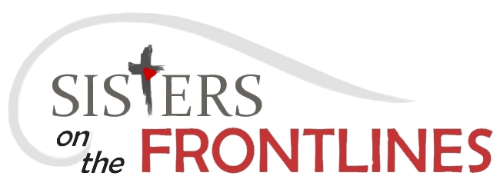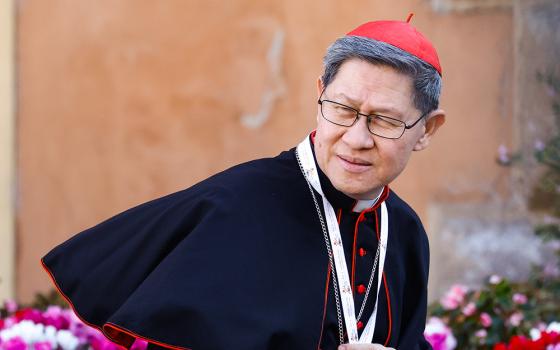
Sr. Gabriela (Gaby) Luna Diaz, is part of Catholic Extension's U.S.-Latin American Sisters Exchange Program, and who, along with two other sisters of the Eucharistic Missionaries of St. Teresa, help Hispanic populations in northwestern Wisconsin face the hardships of the coronavirus crisis. (Catholic Extension/Rich Kalonick)
When the novel coronavirus pandemic swept across the United States, Catholic women religious immediately stepped up to help those affected.
On June 22, a new alliance administered by Catholic Extension was launched that aims to help sisters serving those most impacted by the illness and the economic problems it has caused.
Called Sisters on the Frontlines, the initiative plans to give 1,000 sisters $1,000 each to help an individual or family suffering because of the pandemic.
"[Sisters] have access to communities in need. They know the people who are suffering and the ways in which they are suffering," Joe Boland, vice president of mission at Catholic Extension, said in an interview. "This is a way to get them funds without a complicated bureaucratic process."
The alliance includes the Conrad N. Hilton Fund for Sisters, FADICA, GHR Foundation, the Raskob Foundation for Catholic Activities, Sisters of Charity Foundation of Cleveland and Sisters of Mercy of the Americas. The Conrad N. Hilton Foundation funds Global Sisters Report, and both the Hilton Foundation and GHR are funders of the GSR in the Classroom project.*
Boland said the idea came from FADICA, which ran a small pilot project with the same model with the GHR Foundation and the Sisters of Mercy.
Seed money from the alliance partners is being used to launch the program, with donations needed to reach the goal of $1,000 to 1,000 sisters. Officials hope to send out the first group of 20 to 30 grants by the end of this week, and will keep sending them out as donations come in.
"This 'season' of the coronavirus has asked us to be creative and to think 'out of the box' to address needs," Sr. Pat McDermott, president of the Institute of the Sisters of Mercy of the Americas, said in a statement. " 'Frontlines' is a huge opportunity to extend immediate relief to persons in need, to those who might otherwise have gone unserved."
Advertisement
Fr. Jack Wall, president of Catholic Extension, said it makes sense to direct the money to sisters because they are already on the front lines serving those in need.
"I've often said that you cannot go to the poorest places of the world and not find the presence of the Catholic Church. And so often the face of ministry among the poor is women religious," Wall said in a statement announcing the initiative. "Their work is more important now than ever before, and Catholic Extension is excited to be a part of this alliance to directly fund the sisters whose communities were disproportionately impacted by the pandemic."
Sisters who get funding will report back to the Frontlines alliance on how she fulfilled the mandate to help someone in need. Raising awareness of sisters' innovative and impactful work is another goal of the program, which asks that such stories be shared on social media with the hashtag #sistersonthefrontlines.
One example of sisters on the front lines is Sr. Gabriela (Gaby) Luna Diaz, who is part of Catholic Extension's U.S.-Latin American Sisters Exchange Program. From Mexico, Diaz is in the U.S. with two other sisters of the Eucharistic Missionaries of St. Teresa. They are helping Hispanic populations in northwestern Wisconsin face the hardships of this crisis — including illness, lost jobs, fear and isolation — and maintain their connection with the church.
In Tuba City, Arizona, Daughters of Charity have served the Navajo Nation for 20 years. Already beset by poverty, the reservation was hit hard by the virus, and the sisters fear first responders and the overworked staff at the 76-bed local hospital will suffer from post-traumatic stress disorder after what they've been through. The National Guard has been providing reinforcements for the beleaguered staff there.
Boland said the initiative will prioritize help for Native Americans, agricultural workers and those in the meat processing industry, migrants and immigrants, communities of color and Puerto Rico.
"We're totally in awe of what sisters are able to do, and they do it so many times with very limited resources," he said. "Sisters are a great gift to the Catholic Church, and we hope to leverage that gift."
Large grants from big foundations are great and needed for many things, Boland said, but this initiative will make a significant difference in people's lives, too.
The strength of the project, he said, is that it's "trying to utilize a very powerful network to get funding very, very quickly to where it's needed most."
 To learn more, to donate or to become a frontline partner, visit catholicextension.org/sisters-on-the-frontlines.
To learn more, to donate or to become a frontline partner, visit catholicextension.org/sisters-on-the-frontlines.
*This article has been updated to clarify the funding relationship between the Conrad N. Hilton Foundation and Global Sisters Report.
[Dan Stockman is national correspondent for Global Sisters Report. Follow him on Twitter @DanStockman or on Facebook.]








